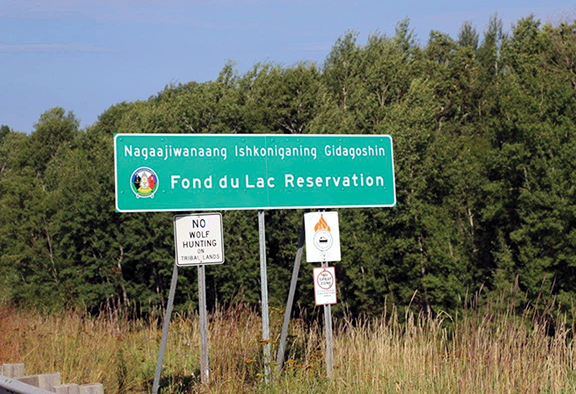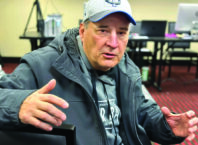
By Lee Egerstrom
The University of Minnesota administrators and Board of Regents are exploring ways for the University to return 3,400 acres of land effectively stolen from the Fond du Lac Band of Lake Superior Chippewa in the late 1800s.
That land on the Fond du Lac Reservation has housed the University’s Cloquet Forestry Center since 1909.
When Congress was passing laws in the 1880s and states took actions to misappropriate millions of acres of Indian lands that were established by earlier treaties, the targeting of Fond du Lac forestry resources was a clear cut case of frontier economics. Land near Cloquet taken from the Band was given to lumber companies with the provision that title would transfer to the University after trees were harvested.
That brought the University onto the reservation to establish a research center for helping the environment and Minnesota’s forest economy from a dubious platform on stolen land. New sensitivities about this history has universities and institutions all across America looking at ways to return indigenous property and sacred items to tribes (see February edition, “Beyond Land Acknowledgement Fund: Indian Lands in Indian Hands.”)
The Board of Regents listened to University President Joan Gabel explain that the University and Minnesota state officials are looking at ways to legally return the land to Fond du Lac, and explore what arrangements for cooperation may be taken among the parties.
In media reports, Gabel told the Regents: “This is the right time to talk about repatriation of this land, returning it to Fond du Lac and what that would mean going forward.”
The Duluth News Tribune expanded on her sentiments in a Feb. 17 article. It quoted Gabel as saying, “We’ve also been having very productive and much-appreciated conversations with Fond du Lac and its members and leadership about the future and the practice needs involved with repatriation and returning ownership, control, care for the land, and what might happen in the future.”
The News Tribune report by Joe Bowen found an initial reaction from Fond du Lac that appears receptive to President Gabel’s comments and intentions:
“The Cloquet Forestry Center land was taken from the Band and return of the land will help to restore the Band’s homeland,” said Rita Karppinen, a spokesperson for the Fond du Lac Band.
Regent Tadd Johnson, who possesses a deep knowledge of how Indian land was taken, commented to fellow Regents, “I think this is a good direction to go in.”
Johnson, a member of the Bois Forte Band of Chippewa and the first Native American appointed to the Board of Regents, said the federal government turned over two-thirds of the land on Ojibwe reservations in 1889, mainly to timber companies. Fond du Lac’s land was secured in the La Pointe Treaty of 1854, or about 30 years before Federal laws began chipping away land from sovereign treaty agreements.
Johnson, a national expert on Indian legal matters, knows that history.
He is Professor Emeritus of the Department of American Indian Studies at the University of Minnesota Duluth and was UMD’s director of graduate studies. He also served the University of Minnesota system as its first senior director of American Indian Tribal Nations Relations.
Johnson has extensive experience with legal issues involving the Native communities. He was a tribal attorney for more than 30 years and has served as judge in tribal courts. He currently serves as a senior advisor for government affairs for the Mille Lacs Band of Ojibwe Indians.
Johnson worked with the U.S. House of Representatives and was staff director and counsel to the Subcommittee on Native American Affairs.
The University and the Minnesota’s 11 tribal nations are riding reparation sensitivities that are gaining momentum all across the nation. But clearing obstacles to repatriation isn’t easy anywhere.
In one report, Jana Peterson of the Pine Knot News at Cloquet found opposition to the land transfer within the University itself and what might be implied opposition from forestry industries.
The Cloquet Forestry Center (CFC) is the oldest forestry experiment station in the nation. It has an arboretum in its grounds that encompasses Camp 8, a 44-acre forest of 200 to 300 year old red pine trees.
There’s more than a hundred years of forestry research tied to the CFC, Peterson noted. Opponents of the transfer said this involves important knowledge of care for forestry, the environment, and wildlife. While that triggers paternalistic thoughts within some faculty members, others may need to point out those are all important interests to the Fond du Lac Band, who regards the land as sacred.
President Gabel told the Regents the University will seek a memorandum of understanding or some other type of agreement with Fond du Lac over continuing CFC research “if the Fond du Lac Band agrees that such research is consistent with the Fond du Lac Band’s mission.”
This, too, would be in step with other actions involving tribes, government agencies and educational institutions.
While the Regents were exploring future ties with Fond du Lac, the U.S. Department of Agriculture announced it has renewed a 30-year memorandum of agreement it has with the 36 federally recognized tribal colleges and universities that are part of the federal land-grant system.
That relationship is geared to help tribal educational institutions produce agricultural, forestry and related food and nutrition leaders for tribal communities. About 75 percent of Indian Country land is either agricultural or forested.
Fond du Lac Tribal and Community College at Cloquet, Leech Lake Tribal College at Cass Lake, and White Earth Tribal and Community College are among colleges connected with
USDA through the American Indian Higher Education Consortium.
The University of Minnesota is the main land grant institution in Minnesota with agricultural and forestry research ties with USDA.
Regarding communications of concern from some forestry industry officials, Gabel said she understood there was industry assumptions that Regents were ready to act on the land transfer at that February meeting.
She stressed the university has legal requirements to confer with the band, with several state agencies, and with others who have interests in the land and university’s mission.
That, she stressed, is a process now underway for which the university doesn’t have a time schedule.
Background stories that can be helpful to the general public can be found at:
• https://www.duluthnewstribune.com/ news/local/still-work-to-be-done-on-cloquet-forestry-center-transfer;
• https://www.pineknotnews.com/story/2023/02/10/news/university-declares-intent-to-return-forestry-center-land-to-fond-du-lac/8723.html;
• https://www.startribune.com/university-of-minnesota-return-forestry-land-to-fond-du-lac-band-of-lake-superior-chippewa/600250488;
• https://www.mprnews.org/story/2023/02/10/u-recommends-returning-cloquet-forestry-center-land-to-fond-du-lac-band.





